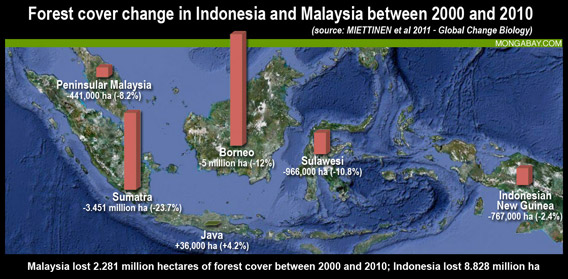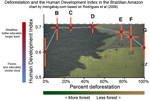
Nearly two-thirds of villagers surveyed across rainforests in Indonesian and Malaysian Borneo are against large-scale deforestation due to the adverse impacts on livelihoods and the environment, finds a comprehensive new study across 185 communities. The research, conducted over a one-year period by an international team of scientists, is published in this week’s issue of the journal PLOS ONE.
The study found that people who live near forests place the greatest value on the benefits they afford, including medicinal plants, game, clean water, and fiber.
“We found that 65 percent of the villagers interviewed throughout Borneo were against large scale clearing of forest because of the negative impacts it generates on their community, for their income, the environment and their access to forest products,” said lead author Erik Meijaard of the Borneo Futures initiative, a new collaborative research project, in a statement. “Besides medicinal plants the majority of communities in Borneo have and continue to use the forest for a wide range of products from subsistence hunting and fishing to timber, mining, geharu, and illipe nuts.”
 Location and geographic context of villages sampled in primary and secondary surveys in Indonesian and Malaysian Borneo.
Location and geographic context of villages sampled in primary and secondary surveys in Indonesian and Malaysian Borneo.
The research, which is based on responses from 1,837 Borneans, found that opinions on deforestation were usually dependent on scale. Small-holder clearing for subsistence agriculture was generally viewed favorably, while large-scale deforestation for industrial timber plantations and oil palm estates was usually seen as having negative impacts. Only a small proportion — less than 20 percent — were supportive of large-scale forest conversion, usually for palm oil development.
The study found “high awareness” of the impacts of deforestation, including “high levels of concern over higher temperatures, air pollution and loss of clean water sources.”
 Perceptions on the Importance of Forest for Health and for Cultural and Spiritual Benefits expressed as percentages of the total of respondents’ answers. |
The authors say the results could inform policy decisions, leading to reduced incidence of social conflict, which is rife in many parts of Borneo where conversion is taking place, including Sarawak in Malaysian Borneo and Kalimantan in Indonesian Borneo. It could also bolster recognition of and support for customary, community-based approaches land management.
“We did this study to be able to provide useful insights for national and local government when it comes to planning areas for development such as large scale plantations and mining because some villages are more open to this type of development than other villages,” said co-author Dr. Marc Ancrenaz of HUTAN, a Sabah-based conservation group. “Seeking out lands where local community are most receptive to such plantations could significantly reduce social conflicts.”
The study comes a little two years after the Indonesian government said it will “recognize, respect and protect” the rights of traditional forest users, including indigenous people, as it works to implement a program to slow deforestation. Meanwhile in May, Indonesia’s Constitutional Court invalidated the Indonesian government’s claim to millions of hectares of forest land, potentially forcing it to grant indigenous and local communities the right to manage their customary forests.
Land tenure issues have long plagued the forestry sector in Indonesia and Malaysia. The bulk of Borneo’s forests are owned by the state, which historically has doled out large concessions — often tens of thousands of hectares in extent — to logging companies. Local communities mostly lose out, leaving some to seek opportunities from illicit timber harvesting. Without clear ownership rights to land, communities have little incentive to reject illegal logging or manage forests for the long-term. The model — which has contributed to the abandonment of traditional land stewardship in many areas — has driven large-scale devastation of the island’s rich forest ecosystems. According to a 2011 study led by Jukka Miettinen, Borneo lost 5 million hectares, or 12 percent, of its forest cover between 2000 and 2010. The island’s peatlands declined by a quarter over the same period.
The Borneo Futures initiative aims to reverse that trend by “changing the mindset of people that have the most influence on land use decisions and forest management” in Borneo, according to organizers. The initiative is a network, rather than an organization.
Citations:
- Meijaard E, Abram NK, Wells JA, Pellier A-S, Ancrenaz M, et al. (2013) People’s Perceptions about the Importance of Forests on Borneo. PLoS ONE 8(9): e73008. doi:10.1371/journal.pone.0073008
- Jukka Miettinen, Chenghua Shi and Soo Chin Liew. Deforestation rates in insular Southeast Asia between 2000 and 2010. Global Change Biology (2011) 17, 2261–2270, doi: 10.1111/j.1365-2486.2011.02398.x
Related articles
80% of rainforests in Malaysian Borneo logged

(07/17/2013) 80 percent of the rainforests in Malaysian Borneo have been heavily impacted by logging, finds a comprehensive study that offers the first assessment of the spread of industrial logging and logging roads across areas that were considered some of Earth’s wildest lands less than 30 years ago. The research, conducted by a team of scientists from the University of Tasmania, University of Papua New Guinea, and the Carnegie Institution for Science, is based on analysis of satellite data using Carnegie Landsat Analysis System-lite (CLASlite), a freely available platform for measuring deforestation and forest degradation. It estimated the state of the region’s forests as of 2009.
Indonesia’s president says he will work to register and recognize customary forests
(06/28/2013) Last month, Indonesia’s indigenous people won the right to manage their own customary forests after a landmark Constitutional Court ruling struck down a law that had previously given the central government control over indigenous land within the country’s forest estate. On Thursday, Indonesian President Susilo Bambang Yudhoyono announced his support for the decision and said he was committed to taking a first step towards its implementation – beginning a process to register and recognize traditional territories.
In landmark ruling, Indonesia’s indigenous people win right to millions of hectares of forest

(05/17/2013) In a landmark ruling, Indonesia’s Constitutional Court has invalidated the Indonesian government’s claim to millions of hectares of forest land, potentially giving indigenous and local communities the right to manage their customary forests, reports Mongabay-Indonesia. In a review of a 1999 forestry law, the court ruled that customary forests should not be classified as “State Forest Areas”. The move is significant because Indonesia’s central government has control over the country’s vast forest estate, effectively enabling agencies like the Ministry of Forestry to grant large concessions to companies for logging and plantations even if the area has been managed for generations by local people.
Will Indonesia’s big REDD rainforest deal work?

(12/28/2010) Flying in a plane over the Indonesian half of the island of New Guinea, rainforest stretches like a sea of green, broken only by rugged mountain ranges and winding rivers. The broccoli-like canopy shows little sign of human influence. But as you near Jayapura, the provincial capital of Papua, the tree cover becomes patchier—a sign of logging—and red scars from mining appear before giving way to the monotonous dark green of oil palm plantations and finally grasslands and urban areas. The scene is not unique to Indonesian New Guinea; it has been repeated across the world’s largest archipelago for decades, partly a consequence of agricultural expansion by small farmers, but increasingly a product of extractive industries, especially the logging, plantation, and mining sectors. Papua, in fact, is Indonesia’s last frontier and therefore represents two diverging options for the country’s development path: continued deforestation and degradation of forests under a business-as-usual approach or a shift toward a fundamentally different and unproven model based on greater transparency and careful stewardship of its forest resources.
Amazon deforestation doesn’t make communities richer, better educated, or healthier

(06/11/2009) Deforestation generates short-term benefits but fails to increase affluence and quality of life in the long-run, reports a new study based an analysis of forest clearing in 286 municipalities across the Brazilian Amazon. The research, published in Friday’s issue of the journal Science, casts doubt on the argument that deforestation is a critical step towards development and suggests that mechanisms to compensate communities for keeping forests standing may be a better approach to improving human welfare, while simultaneously sustaining biodiversity and ecosystem services, in rainforest areas.














